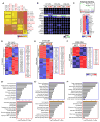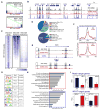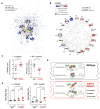Disease Model of GATA4 Mutation Reveals Transcription Factor Cooperativity in Human Cardiogenesis
- PMID: 27984724
- PMCID: PMC5180611
- DOI: 10.1016/j.cell.2016.11.033
Disease Model of GATA4 Mutation Reveals Transcription Factor Cooperativity in Human Cardiogenesis
Abstract
Mutation of highly conserved residues in transcription factors may affect protein-protein or protein-DNA interactions, leading to gene network dysregulation and human disease. Human mutations in GATA4, a cardiogenic transcription factor, cause cardiac septal defects and cardiomyopathy. Here, iPS-derived cardiomyocytes from subjects with a heterozygous GATA4-G296S missense mutation showed impaired contractility, calcium handling, and metabolic activity. In human cardiomyocytes, GATA4 broadly co-occupied cardiac enhancers with TBX5, another transcription factor that causes septal defects when mutated. The GATA4-G296S mutation disrupted TBX5 recruitment, particularly to cardiac super-enhancers, concomitant with dysregulation of genes related to the phenotypic abnormalities, including cardiac septation. Conversely, the GATA4-G296S mutation led to failure of GATA4 and TBX5-mediated repression at non-cardiac genes and enhanced open chromatin states at endothelial/endocardial promoters. These results reveal how disease-causing missense mutations can disrupt transcriptional cooperativity, leading to aberrant chromatin states and cellular dysfunction, including those related to morphogenetic defects.
Keywords: GATA4; TBX5; birth defect; cardiomyopathy; congenital heart defects; disease modeling; epigenetics; gene regulation; heart development; systems biology.
Copyright © 2016 Elsevier Inc. All rights reserved.
Figures







Comment in
-
A Breakdown in Cooperativity Leads to Cardiac Identity Crisis.Cell. 2016 Dec 15;167(7):1674-1676. doi: 10.1016/j.cell.2016.11.056. Cell. 2016. PMID: 27984717
-
Congenital heart disease in a dish: progress toward understanding patient-specific mutations.J Thorac Dis. 2017 May;9(5):E510-E513. doi: 10.21037/jtd.2017.03.178. J Thorac Dis. 2017. PMID: 28616324 Free PMC article. No abstract available.
References
MeSH terms
Substances
Grants and funding
- R01 EB006745/EB/NIBIB NIH HHS/United States
- T32 GM007618/GM/NIGMS NIH HHS/United States
- UM1 HL098179/HL/NHLBI NIH HHS/United States
- U01 HL100406/HL/NHLBI NIH HHS/United States
- R01 HL057181/HL/NHLBI NIH HHS/United States
- R21 HL130993/HL/NHLBI NIH HHS/United States
- T32 HG000044/HG/NHGRI NIH HHS/United States
- 14POST18360018/AHA/American Heart Association-American Stroke Association/United States
- T32 HD007470/HD/NICHD NIH HHS/United States
- R01 HL122887/HL/NHLBI NIH HHS/United States
- C06 RR018928/RR/NCRR NIH HHS/United States
- P01 HL089707/HL/NHLBI NIH HHS/United States
- U01 HL098179/HL/NHLBI NIH HHS/United States
LinkOut - more resources
Full Text Sources
Other Literature Sources
Medical
Molecular Biology Databases
Research Materials

